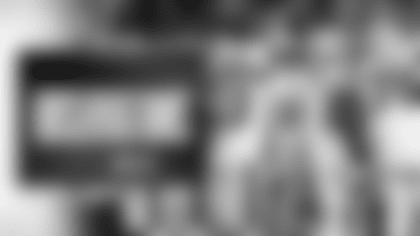New England Patriots head coach Bill Belichick addresses the media during his press conference at Gillette Stadium on Tuesday, August 11, 2009.
Q: Peyton Manning commented on training camp facilities being on and off-site. Can you talk about the pros and cons of having training camp onsite versus off-site?
BB: I think anytime you make a decision like that with your team there are advantages and disadvantages to doing whatever you decide to do. I think we have a good training camp setup here. I think there are a lot of advantages to it, certainly the facilities, the fields, the weight room, the training room, our video facilities, things like that would be very difficult. It would be impossible really to replicate those somewhere else, no matter where you move them to. So I think those are all positives. I think that probably the nature of Peyton's [Manning] comments about going through things in a different environment with your team just together kind of - by itself - that there can be positive experiences gained from that as well. So that's probably what he's [Peyton Manning] referring to. We can relate to that. When we were in San Jose last year for that week of practice. there were a lot of positive opportunities for the team to be together and do things together that we normally wouldn't do that I think in the long run were beneficial. The overriding thing here would be all the facilities that we have and the ability to be efficient and get our players good treatment and medical area, weight training area, and all our video equipment and everything. It goes a lot faster and smoother in this set up.
Q: When you talk about game planning for the Eagles, is it like preparing for a regular-season game?
BB: There isn't too much game planning. At least from our end, there's not a lot of game planning for a game like this. They're going to play a lot of people [and] I'm sure we're going to play a lot of people. They're going to work on things they want to work on and we are going to work on things we want to work on. They're not specific to a particular player or a particular scheme and I think really it's important for our players to be able to learn how to use the techniques that they've been taught and apply them in situations that are favorable and situations that are maybe unfavorable. We can at least learn why we wouldn't want to do those things in a particular situation; why we wouldn't want to call this play against a certain type of thing. Those are some lessons that we'll learn. On the other hand, I don't think you want to put your team in a position where they really just don't have a chance, running plays that have no chance to being successful because of what the other team is doing. You want to have a balance, where it's a fair fight and it's competitive and you have a chance to work on the things you want to work on without having to get blown up because you just can't handle something that they're doing. I think you want to game plan enough where you can avoid that situation, but certainly be able to run a certain play against a certain thing that the opponent is doing. I think we kind of know which of those work and which ones don't work anyway. We don't need to experience that in a preseason game, to know that this play will work against that defense. We would rather just run whatever we have and learn how to execute it.
Q: You continue to spend a lot of time on situational football, particularly in this practice. I've heard it in the past that guys jumping offside drove you crazy. What are some of those things that drive you nuts as a coach about situations like that, goal-line situations?
BB: Well, there are thousands of situations in football and you can't really cover all of them. You try to cover a lot of basic ones and try to use that base to build and have that extend into other situations that are similar or maybe that follow it up. The one you brought up is one unique situation, but there are a thousand other ones like that and again in the end you try to get your whole team to understand conceptually what we are trying to do or not to do and not just rely on one person to try to tell everybody because a lot of times there just isn't time for that. I would say the thing that frustrates me the most as a coach would be something that we've gone over multiple times and still can't get right if it's a situation or a play or a technique or whatever it is if you spend a lot of time working on something and you still can't do it properly then that's not a good feeling.
Q: Have you ever taken something out of the playbook after you find players just can't run it no matter what?
BB: Absolutely. Yeah, absolutely. Anytime we put something into a playbook we usually delete something else. Otherwise, it's like having four phone books. There are only so many hours in the day. There are only so many plays in a game. So if you only on an average have 65 plays in a game, offensively or defensively, you probably don't need 600 plays to run 60. So right, if we are going to commit time to something that is new, we probably need to delete time from something else in order to make that. Otherwise, we would just be doubling and tripling the length of practices every year and that's not really an option. Absolutely throwing things out is just as important as putting things in.
Q: How satisfied or unsatisfied are you with what this group has given you going on to the preseason schedule?
BB: Training camps [are] always a time to a large degree [of] uncertainty. I think probably every team in the league, all 32 teams feel a certain positive element to what is going on in their camps and there's probably another area of concern that isn't quite what they want it to be or a personnel situation or an injury or whatever it happens to be. Every team I've ever … In 35 years, it's all been the same. There have been things you feel good about in camp and there are other things you are concerned about and then when you get to the regular season that usually changes. Some of the things you feel good about in the regular season, you won't feel as good about and some of the things you are concerned about may not be that big of a problem. Right now, we are working against each other and how do we match up against our team in offensive and defensive practices is one thing. How our team will match up against different opponents on the schedule is usually another thing so I really can't answer that question. I think we're making progress in all the areas that we've addressed. How far are we? Will it be enough? Will it not be enough? Who knows? That's why all the games are sold out that's why a lot of people will be watching them on TV to see what happens, nobody knows the answer to those questions. It will be a work in progress. We will keep addressing it day-to-day, week-to-week, game-to-game, and the things we have problems with - hopefully - we will try to correct and straighten out and, our strengths. we will try to continue to build on those, as I'm sure our opponents will try to not let us do them. That's the battle we face.
Q: Do those weaknesses show up immediately or reveal themselves as camp goes along or is there no set rule?
BB: There's no set rule. Again, sometimes until you get into the regular season and teams start game planning for you and they start matching up plays and schemes against yours and start matching up players against and those match-ups and try to create advantages for themselves and try to negate the advantages you're trying to gain. It's hard to know exactly where you are. Sometimes, you can see a problem and it continues to be a problem and you know it and can't solve it. Many other times, again, things that you think are going to be good aren't that great and other things you think are going to be bad are OK. Again, we are playing against ourselves and how the Patriots match up against the Patriots will be different than how the Patriots match up against the Eagles. That I'm sure of. So it will be a great experience for us, Thursday night. We are going up against an excellent football team. Over the last decade, they've been as good as any team in the league, offensively; defensively, their production has been tremendous, year in and year out. They are well-coached; they've got a great staff. They've had outstanding coaches, guys that have gone from that staff to be prominent members of other staffs and so forth - head coaches, personnel people and so on. So they're strong. They're sound. They do everything well and they've done it well for a long time. I'm sure they won't change; there's no need to. They have acquired some great players in the off-season and they have continued to get better. This will be a great opportunity for us Thursday night to go up against a real good, sound, well-coached football team and see where we're at.
Q: There have been some reports that you are bringing in at least two veteran defensive end-types. Is that a depth concern? Can you talk about that?
BB: We've brought in I don't know how many. Our personnel department Nick [Caserio] and Jason [Licht] and our other scouts, we've brought in a lot of players since the beginning of training camp. I'm sure we've had a couple dozen in here and that's part of the process of knowing what the next step is; knowing that if we needed a player at a certain position, who would be available whether those players are: A, healthy; B, in condition; C, would be a fit in our organization, depending on what are need was. Again, just because those players are veteran players and there's a history on those players, just like our own players, you know we're in a new season and we want to make sure we evaluate everything based on 2009, not based on some other year or something else. It's a constant process we'll continue to bring players in. You can write that story every week if you want to that we brought somebody in and looked at him and that's true. That's what we do. We do it on a regular basis, that's what the personnel department does and they do a good job of it.
Q: Is there a certain aspect of training camp that you prefer more, applying plays in game situations versus the teaching part of each individual practice?
BB: I honestly can say I enjoy every part of it, not that there aren't moments of frustration. I enjoy coaching the rookie players, the guys that are wide-eyed and bushy-tailed, that don't really know anything about pro football and are just trying to learn. I enjoy coaching versatile players that can do a lot of different things and we have some of the best players in the league and have had on Giants teams, on Cleveland teams; some of the elite players in the league that are really special and coaching them and being able to do things with them that very few other players can do. Obviously, I enjoy that part of it, too. The game planning, the preparation and of course the actual competition that we have once a week against another quality opponent, I enjoy those aspects of it. Really, there is a lot of diversification to this job, but I really enjoy each of the stages that go along with it. Whichever one it is, then I'll try to get into that one and do the best I can. When it comes time to turn the page and do something else, I know that's important, too. That goes into the whole player development process,too; whether it's college, draft choices, free agents, pro free agents, development of players that are on our roster that are first-, second-year players, seeing them grow and develop. I mean I enjoy all those aspects of it, too.
Q: Can you just speak to the excitement of having Tom Brady back at the helm and the guy's excitement as you get ready to start it up?
BB: Well, Tom's worked hard in the offseason. He's been a great player for this organization for many years and we're glad to have him back out there, as well as other players that didn't get a chance to complete their seasons last year either, like Laurence [Maroney], Adalius [Thomas]. It's certainly good to have them all back out there and it's certainly good to have Tom. He's meant a lot to this team and he's worked hard to get back on the field. I'm glad that he has an opportunity to do what he loves doing and I know he loves football.
Q: Can you speak to how the play calling mechanics will work with Josh McDaniels gone?
BB: Well, ultimately you can say that I am responsible for the plays. So if things don't go well, then I'm sure I'll hear about it from all of you.
Q: What's your thought process in terms of how you determine, for a preseason game, what unit will play and what players will play what?
BB: Well, again, you try to balance a lot of things. There's certainly an element of what each individual player needs and that isn't the same for all the players on the same unit. But then there's also an element of what a unit needs. So how much does the one offensive group need to play and - within that group - how much do the individual players need to play? Some more than others. And also there are other situations where you have, what I would say is, true competition, where there are some cases now-at this point in training camp-where some players have started to separate themselves from the competition and it's probably pretty obvious to you and me who some of those players are. There are other positions where I think there's a great deal of indecision and decision-making coming as to who will make the team, who will have certain roles, who will play in what roles and how much they'll do them, and also how to balance those roles. That's a consideration, too, of how to conduct that competition and how to evaluate it and there's also the element of bringing versatility and depth to your team by having players do different things; have them play different positions; have them do different roles and in the end we only have 45 players on game day and we have to split up a lot more than 45 jobs with those players. So there's an element of training that goes on in the preseason games for that. Collectively, you try to put all those things together and I would say the body of work over the entire preseason to make those decisions. So, in other words, what we do this game is probably different than we'll do the next game or the third game just so we can get all those things checked off on our list.
Q: Do you feel it's important or necessary for Tom Brady to play in the preseason given what happened last year?
BB: I think it's important for every player to be ready on opening day and be ready for the start of the season and again, I think for each individual player I could answer that question a lot of different ways. As we get closer to the game - this afternoon, tonight, tomorrow - we'll talk about our playing rotation, what we feel each player needs and how to balance that with some of the other things I just mentioned. I think that there are aspects that are positive [on] veteran players playing in preseason and I can also think of a lot of examples where players didn't play in preseason and still had very productive seasons and were great players. I think that answer varies from player to player and possibly from year to year, too. We'll take each case individually and start to make those kind of decisions in the next couple of days. At this point, what we are really trying to do from the start of training camp-until pretty much tonight-is get through these string of practices, accomplish some of the things we've earmarked on the calendar and decide how we want to play the Philadelphia game. It's not the other way around.
Q: It sounds like this game is testing the Patriots against the Patriots. Does opponent film study play any less of a role in this preseason game when you have one game's worth of film to watch, are you still able to learn things from seeing the Eagles play last year?
BB: Well, sure. We definitely watched them play last year. But, yeah, I think that to a certain degree [it's] less relevant than next week when we will watch Cincinnati play their first preseason game prior to our second game with them. You can still watch players play from last year and certainly their schemes and particularly with a team like the Eagles that has been so successful, has done so many things well for so many years; they're not going to change a lot and they shouldn't. They've just had too much success with it, but they do a lot of things so it's not like there's only one thing you've got to worry about. They have a pretty expansive system, but we can definitely watch it, learn from it, prepare for it, how much of it we'll get, how much of it the people will change and how many different players will play at different positions. I'm sure there will be a lot of that and I'm sure we won't be as fully prepared for all of it as we'd like to be, but we're all in the same boat on that one. I mean they don't have any more film on us as we have on them in this case.
Q: What's the biggest challenge of playing against Donovan McNabb?
BB: Well, I think Donovan does a lot of things well so there's not one thing you can just isolate. He uses all of his receivers, certainly, the backs and tight ends are a big part of their passing game. They throw the ball quickly most of the time, but he has an excellent arm, has a good deep ball, can get it down the field. He's strong in the pocket. He's big. He's strong, hard to bring down and also mobile and athletic back there. I think he's one of the top quarterbacks in the league and he does a lot of things well, therefore, he's hard to defend.
Q: Would you ever match starters against starters for a period or do you just stick to your own script?
BB: I'd say both. I've gone into preseason games saying when they take their guys out we'll take our guys out and sometimes there've been years where, if you have problems on your offensive line, injuries or just overall performance, if you're worried about your first line, you might be really worried about your second line and then you might not want to leave them in against their top defensive unit just because of what's behind them. I think you could do that, defensively, you just feel like your second unit defensively isn't going to be competitive against the first unit they have, you might want to match that. I'm not saying you would, but we've done that in the past. That's more the exception than the rule, but it does occur. On the other hand, you could put your players out there and let them play and if they play against somebody better than them then great, you evaluate that. If they play against somebody that they're better than - you would hope that you come out on the better side of those matchups. You could do it either way.
Q: Why wouldn't Tom Brady play on Thursday?
BB: We'll do what's best for the football team so whatever decisions those are that's the combination of the team and the player. Whatever is best on that, that's what we'll do. Some players will play. Some players won't play. Some players will play more than others and those decisions-that will be on all the factors that we've already talked about.
Q: You've said in the past that the job of the quarterback is to enable the offense to score points. When you are in a preseason environment is the evaluation a little more nuanced than that because they are working with different units and different guys?
BB: Yeah and I think no matter which quarterback it is and no matter which players, there's going to be an element of working with different people. That's part of camp and I am sure Philadelphia's doing the same thing. They have different people working at different positions. I don't think it's unique to us. It does affect your timing a little bit and sometimes your communication. On the other hand, those are challenges that at some point we're all going to have to phase during the season one way or another and now's the time to start to address that. I think it does affect your timing and execution, but I don't think there's any other way to do it. Just practice one group of guys and not work the other guys - you can't really do that. So that's the way it is.
Q: Do you have to factor that to the evaluation process?
BB: I think you do, but in the end it probably evens out. I don't think there's a big advantage for one player working with those variables or another. In the end, it gets back to how well that individual player executes his job and then to a certain degree how he works with the people around him. We've had a lot of cases. I could think of several examples where we've had one player kind of excel or play well while the group that he was out there with was horrendous. But you see something from one player and you don't lose sight of that even though the product of the entire group was pitiful and vice versa. You can go out there and see a unit perform really well and at the same time not feel good about the performance of a player within that unit so it's inexact. It's far from perfect, but we try to look at it with a fine tooth comb, be objective and see what's there.








































